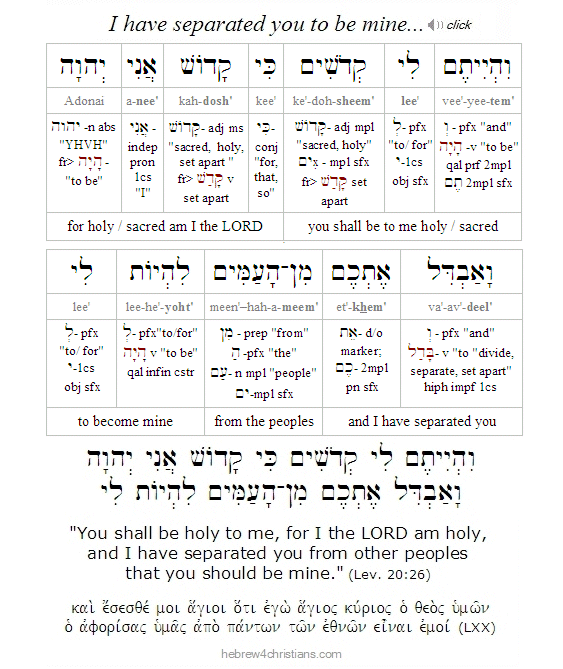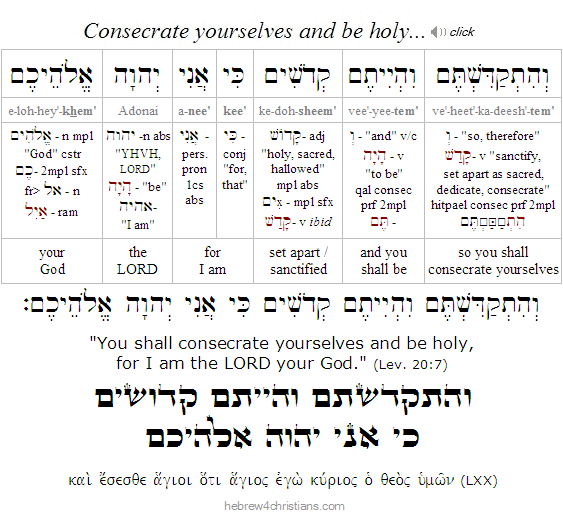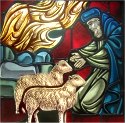|
The Torah records God's first act of creation with the imperative utterance: "Let there be light" (i.e., yehi or: יְהִי אוֹר) and then goes on to say that "God separated (וַיַּבְדֵּל) the light from the darkness (Gen. 1:3-4). It is this "separation," or distinction, that is foundational to the concept of kedushah (קְדֻשָּׁה), or "holiness." Holiness is also expressed in the distinction between ordinary and sacred time: "God blessed the seventh day and made it holy" (יְקַדֵּשׁ) because on it God rested from all his work that he had done in creation" (Gen. 2:3).
The overall theme of the Book of Leviticus is kedushah, and indeed the Hebrew root (קדשׁ) occurs over 150 times in the book. Since God is kadosh (קדשׁ), we must be kadosh in our lives as well, and this means first of all being conscious of the distinction between the sacred and the profane, the "clean" and the unclean, and so on. "You are to distinguish between the holy and the common, and between the unclean and the clean" (Lev. 10:10). Note that the word translated "distinguish" (וּלֲהַבְדִּיל) comes from the same verb used to describe how God separated the light from the darkness. We are to separate between (בֵּין) the holy and the profane, which means we need understanding (i.e., binah: בִּינָה), or the ability to discern between realms of reality... As it is written, "You shall be holy to me, for I the LORD am holy and I have separated you (וָאַבְדִּל) from other people that you should be mine" (Lev. 20:26).
וִהְיִיתֶם לִי קְדשִׁים כִּי קָדוֹשׁ אֲנִי יְהוָה
וָאַבְדִּל אֶתְכֶם מִן־הָעַמִּים לִהְיוֹת לִי
vee·yee·tem · lee · ke·doh·sheem · kee · kah·dosh · a·nee · Adonai
va·av·deel · et·khem · meen-ha·a·meem · lee·he·yoht · lee

"You shall be holy to me, for I the LORD am holy
and I have separated you from the peoples to be mine"
(Lev. 20:26)

There is no other way to approach the Holy One apart from consciousness of His infinite glory and unsurpassable worth. "I will lift up my eyes to the hills" (Psalm 121:1). As the Holy One (i.e., ha-kadosh: הַקָּדוֹשׁ), the LORD (יהוה) is utterly unique, distinct, sacred, and set apart as the only One of its kind. He alone is worthy of true worship and adoration, since He alone is utterly peerless, without rival, and stands in relation to the world as Creator, Redeemer, and Lord. To affirm the LORD is holy is to be conscious that He is utterly sacred.
Holiness involves first of all the awareness or consciousness that there is a realm of reality "higher than" the material world (the light God created and separated from darkness was not physical), and this realm of reality is centered on Person and Will of God. A denial of this leads to the idolatrous view that material (i.e., profane) reality is absolute and therefore ascribed eternal worth. "The fear of the LORD is the beginning of wisdom." However, the LORD does not want us to merely recognize His holiness (in some abstract or intellectual sense) but calls us to be in relationship with Him, and this implies personal sanctity and separation: Again, "you shall be holy to me, for I the LORD am holy and I have separated you (וָאַבְדִּל) from other people that you should be mine" (Lev. 20:26). The purpose of the sacrificial system was to draw near to God, and this "drawing near" required a separation from the profane world and its habitual uncleanness. The call to be holy is therefore the call to wake up and become alive to God's Presence in this world.
Hebrew Lesson
Leviticus 20:7 reading:
 |
|




